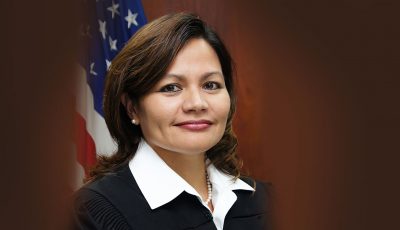Why Manglona didn’t recuse from $40M lawsuit?
U.S. District Court for the NMI Chief Judge Ramona V. Manglona denied a motion of the son of former Saipan mayor Donald Flores and Cecilia U. Flores for her to recuse from his mother’s $40-million lawsuit.
Derron Gerard Flores, through counsel Juan T. Lizama, filed his motion to recuse the next day after Manglona heard his request to substitute as plaintiff for his mother, Cecilia Flores, who passed away in September 2015.
In an order issued on Monday denying Derron Flores’ request to recuse, Manglona ruled that a reasonable person with knowledge of all the facts would not question her impartiality in this case because of the participation of her husband, CNMI Supreme Court Associate Justice John A. Manglona, in the Indalecio v. Yarofalir decision.
Manglona heard last April 21 Derron Flores’ motion to substitute.
Manglona said the central issue in that motion to substitute is whether Cecilia Flores’ claims against defendants survive her and may be continued by her son, Derron.
The defendants in Cecilia Flores’ lawsuit are MUFG Union Bank, Ken Kato, and Victoria B. Concepcion. She sued the defendants over a bank manager’s alleged unauthorized release of Donald Flores’ money years prior to his death from his $200,000 time certificate of deposit to a person representing him.
Manglona said in their briefing papers and at oral argument, the parties focused on whether Indalecio v. Yarofalir, a case decided by the CNMI Supreme Court in 2006, controls the outcome.
Manglona said defendants say it does control, but Derron Flores, through counsel, says it doesn’t.
Associate Justice John Manglona was one of three justices who decided the Indalecio case.
Manglona said prior to and during the April 21 hearing, no party objected to her deciding the substitution motion on grounds that her husband’s participation in Indalecio case might somehow taint her judgment.
The next day, April 22, Derron Flores filed the motion to recuse “on the ground that the issue before the court involved the same matter” that Manglona’s husband heard in Indalecio case.
Lizama asserted that this circumstance creates a reasonable question whether Manglona can be impartial.
In denying the motion, Manglona said a judge must disqualify herself “in any proceeding in which [her] impartiality might reasonably be questioned.”
Manglona said Derron Flores’ description of the situation is inaccurate.
Manglona said this matter is not the same as Indalecio case, and the issues are different.
Manglona said Cecilia Flores’ case doesn’t involve the same matter as Donald Flores’ lawsuit against First Hawaiian Bank.
She noted that the subject of both cases is a dispute over the fate of a $200,000 certificate of deposit that Donald Flores purchased in 1993.
Manglona said Indalecio case is a different matter, concerning the cause of death of Christopher Indalecio in 2002.
She pointed out that the issues, too, are unrelated.
Manglona said the disputed point in Indalecio’s case is whether Christopher Indalecio’s medical malpractice claim against a doctor and hospital survived his death.
In Cecilia Flores’ case, the judge noted, it is whether her fraud claims against a bank and its officers survived.
Manglona said she was not being called on to uphold or undo what then-chief justice Miguel Demapan, then-associate justice Alexandro Castro, and her husband held and did in the Indalecio case.
Manglona said even if her husband, Justice Manglona, had dissented, she would still have to follow the majority’s holding.
“My decision on Derron’s motion for substitution will have no effect on the right of Indalecio’s estate administrator to pursue its claim, even if that litigation is still ongoing,” the judge said.
Manglona said what Derron Flores seems to have in mind when he refers to “matter” and “issue” is a pure question of law: whether in the CNMI a victim’s tort claims survive the victim’s death and may be continued by the estate.
In that limited sense, Manglona said, the two cases are similar, but such similarity cannot reasonably be thought to create an appearance of impartiality.
“Otherwise, no judge could ever sit on a case that presented a legal question similar to one she had decided in a previous case,” she said.
Moreover, Manglona said, Derron Flores’ motion for substitution does not require her to determine or even opine on whether the CNMI Supreme Court, including her husband, correctly decided the questions presented in Indalecio case.
Manglona said her task is to discern what the CNMI Supreme Court held and whether that holding applies to Cecilia Flores’ claim.
“In doing so, I exercise nothing remotely similar to appellate authority,” said Manglona, adding that her decision will not have any effect on the state of the law in the CNMI as determined by the Commonwealth’s highest court.
On the issue of filing the recusal motion after hearing the motion to substitute, Manglona said it cannot escape attention that Derron Flores’ counsel did not suggest she recuses herself until after the hearing.
Manglona said the implication is that counsel was content to let her decide the motion until he received the impression, from her comments and questions at the hearing, that she might not be reading Indalecio’s case in a way favorable to his client.
Manglona said so long as she appeared inclined to issue a favorable decision, the counsel apparently had not trouble with the alleged risk of partiality.
In a separate order on Monday, Manglona denied Derron Flores’ request to substitute as plaintiff to allow him to pursue his mother’s lawsuit against a bank and its former employees.
In the same order, the judge dismissed without prejudice Cecilia Flores’ lawsuit. Dismissal without prejudice means the case can be re-filed in the future.
Manglona ruled that because Cecilia Flores’ claims were extinguished when she died in September 2015, Derron Flores’ motion to substitute him as plaintiff in the lawsuit is denied.
When Donald Flores died in June 2014, Cecilia Flores was appointed administratrix in the probate of his estate.



























